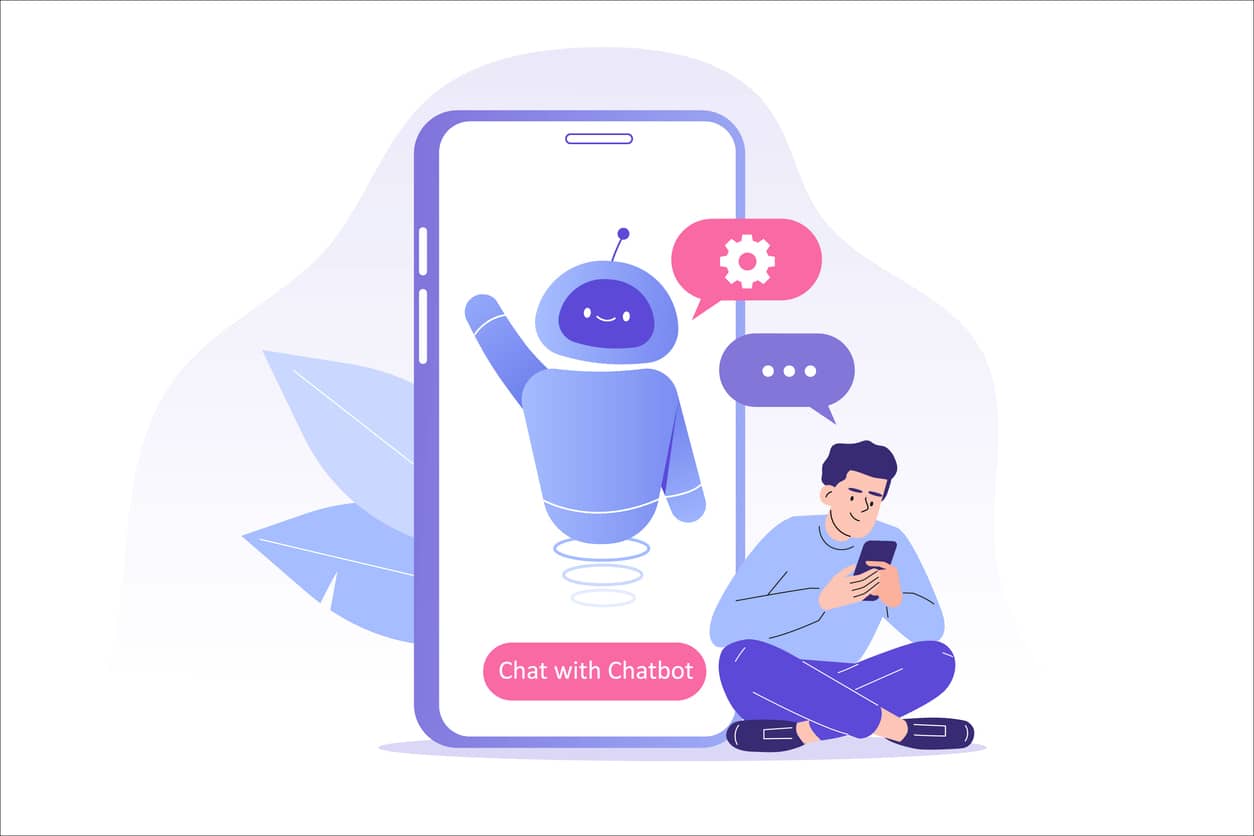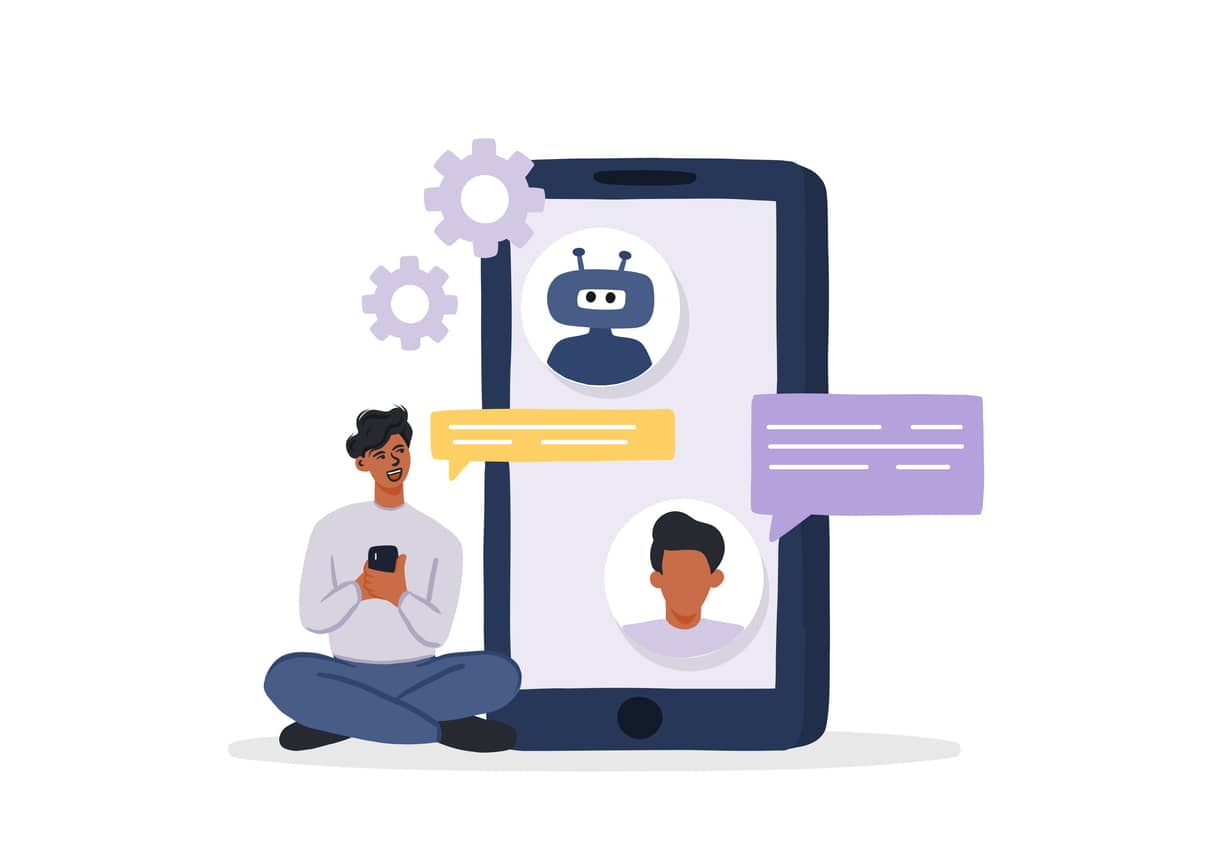Our selection of the best AI-based chatbot apps
The world of chatbots has undergone a metamorphosis, evolving from clunky, pre-programmed responses to sophisticated AI-powered interactions. At the forefront of this revolution stand three titans: Google, Microsoft, and OpenAI. Each platform boasts its own unique strengths and approaches, captivating users with a spectrum of possibilities.
- Microsoft Co-pilot: In the familiar Microsoft 365 ecosystem, Co-pilot shines in productivity enhancement. It suggests relevant information, completes tasks, and even writes code snippets seamlessly integrated into your workflow. It also offers a free tier and a premium version (Copilot Pro) with enhanced features like code translation and image generation.
- Google Gemini: Formerly Bard, Gemini boasts access to the powerful Gemini Pro and Gemini Ultra models, catering to diverse needs. The free version handles basic tasks and conversations, while Gemini Advanced (subscription-based) tackles complex problems and holds longer, context-aware dialogues. It excels in search enhancement and content creation, making it a versatile tool for knowledge workers and creative professionals.
- ChatGPT: OpenAI’s popular offering excels in creative text generation. It can craft poems, scripts, emails, and even marketing copy, sparking inspiration and accelerating content creation. While its free tier has limitations, the paid ChatGPT Plus expands possibilities with longer responses and priority access. However, be mindful of potential factual inaccuracies and biases that might require human oversight.
Are you drowning in emails, swamped by scheduling battles, and battling repetitive tasks? Fear no more – the future is here and takes the form of powerful AI chatbots app. This section dives into these intelligent apps that focus on solving difficulties for each department, from HR to marketing and beyond.
- Powell Buddy: Seamlessly integrates with Powell Intranet for efficient content creation and information retrieval. It can answer questions, create or optimize text, generate images, and offer mobile and speech-to-text access. Powell Buddy is tailored for intranet needs, unlike broader solutions. It’s ideal for businesses prioritizing internal efficiency, knowledge management, and employee engagement. As a knowledge management tool, Powell Buddy really shines. It can be trained on your own data so you can be sure employees get relevant and correct information.
- Drift: Designed for sales and marketing teams, offering targeted lead generation and live chat functionalities.
- Intercom: Perfect for customer service with its rich conversational features and powerful analytics.
- Amelia: IBM’s AI assistant, specializing in customer service and technical support tasks.
Remember: The best chatbot app depends on your specific needs. Before deciding, consider factors like budget, target audience, and required features.

Criteria to consider when selecting the best AI-based chatbot app
Natural Language Processing (NLP): How well does the chatbot understand and respond to natural language conversations?
- Understand complexity: Look for a chatbot that grasps keywords, context, intent, and emotional tone. Consider testing with diverse queries and scenarios to assess its ability to handle complex nuances.
- Domain-specific understanding: If your chatbot caters to a specific industry or profession, opt for models trained on relevant data, ensuring they understand specialized terminology and jargon.
- Error handling: Evaluate how the chatbot handles unclear questions, typos, or slang. Does it offer rephrasing suggestions, provide helpful clarifications, or gracefully admit limitations?
Customization: Can you personalize the chatbot’s responses and appearance to match your brand identity? Can you train the chatbot on your own data? Can
- Branding flexibility: Ensure the chatbot’s appearance and voice align with your brand identity. Can you customize logos, colors, greetings, and response styles?
- Personality tailoring: Choose a platform that allows defining the chatbot’s personality traits, from professional and informative to witty and conversational, matching your target audience preferences.
- Workflow integration: Look for options to personalize conversation flows based on user segments or specific situations, creating a tailored experience for each interaction
Integrations: Does it integrate seamlessly with your existing CRM, marketing, or support systems?
- Seamless connections: Ensure the chatbot integrates smoothly with your existing CRM, marketing automation tools, and support systems. Data exchange should be automated and hassle-free.
- API availability: Assess the platform’s API capabilities for advanced integration possibilities. This allows custom development and a deeper connection with your unique infrastructure.
- Data consistency: Verify how the chatbot handles data across different systems, guaranteeing consistent information and avoiding conflicts.
Analytics and Reporting: Can you track chatbot performance and user engagement with detailed reports?
- Performance metrics: Track critical metrics like chatbot responses, user engagement, resolution rates, and sentiment analysis to gauge effectiveness and identify areas for improvement.
- Customization options: Choose a platform offering customizable reports that align with your goals. Do you need insights into lead generation, customer satisfaction, or specific conversation topics?
- Actionable insights: Ensure the reports provide actionable insights, helping you optimize chatbot performance and refine conversation flows for better results.
Security and privacy: Does the platform ensure data security and user privacy compliance?
- Data security: Verify that the platform adheres to industry-standard security protocols and encrypts all sensitive user data. Look for certifications like SOC 2 or HIPAA compliance for added peace of mind.
- Privacy compliance: Ensure the chatbot complies with relevant data privacy regulations like GDPR or CCPA. Transparency about data collection and usage is crucial.
- User consent: Choose a platform that obtains user consent for data collection and interaction with the chatbot, fostering trust and transparency.

What are the key features offered by the best AI chatbot apps?
- 24/7 Customer Support: Offer assistance anytime, anywhere, eliminating wait times and frustration.
- Lead Generation and Qualification: Capture leads proactively and identify promising prospects.
- Personalized Interactions: Deliver customized responses based on user preferences and past interactions.
- Multi-Language Support: Cater to a global audience by offering multilingual chatbot interactions.
- Content Creation: Utilize AI to generate engaging content, product descriptions, and marketing materials.

Some examples of successful AI chatbot applications
- Sephora’s virtual assistant: Recommends beauty products based on user preferences and skin concerns.
- Hilton’s bot: Answers guest questions, handles room reservations, and provides local recommendations.
- Bank of America’s Erica: Assists customers with account management, bill payments, and financial transactions.

Future trends in AI-powered chatbots
AI chatbots are brimming with exciting possibilities, promising ever-more sophisticated interactions and transformative experiences. Let’s explore some key trends that will shape the future:
1. Advanced AI models:
- Beyond understanding: Chatbots will move from simply comprehending words to grasping deeper semantic meaning, intent, and emotional nuances. Imagine bots that answer your questions accurately and respond with empathy and understanding, even anticipating your needs.
- Personalized learning: Expect AI models that continuously learn and adapt based on individual user interactions and preferences. This personalization will create a unique and dynamic conversation experience for each user.
- Explainable AI: As chatbots become more complex, transparency and explainability will be crucial. Imagine bots that offer solutions and explain their reasoning, fostering trust and user confidence.
2. Omnichannel experiences:
- Seamless transitions: Chatbots will transcend platform boundaries, seamlessly integrating with websites, mobile apps, voice assistants, and wearable devices. Imagine starting a conversation on your phone and effortlessly continuing it on your laptop, with all context and history preserved.
- Unified persona: Expect a consistent brand personality and voice across all interaction points, creating a cohesive and familiar experience for users, regardless of their chosen platform.
- Contextual awareness: Chatbots will leverage real-time data and user context to provide relevant and timely responses. Imagine a chatbot in a smart home that adjusts the temperature based on your voice tone or suggests recipes based on what’s in your fridge.
3. Personalization beyond imagination:
- Adaptive responses: Chatbots will dynamically tailor their responses based on individual user preferences, emotions, and even biometrics. Imagine a bot that adjusts its communication style, humor level, or language depending on your personality and mood.
- Predictive recommendations: Expect bots anticipating your needs and proactively offering suggestions or solutions. Imagine a bot that reminds you to buy groceries when you’re running low on supplies or recommends a movie based on your past viewing habits.
- Evolving relationships: Chatbots will build long-term relationships with users, learning their preferences and adapting their interactions accordingly. Imagine a bot that remembers your past conversations and builds upon them, creating a personal and meaningful connection.
- These are just a few glimpses into the future of AI-powered chatbots. As technology evolves, we can expect even more groundbreaking advancements, blurring the lines between human and machine communication and fundamentally changing how we interact with the world.
Choosing the best AI chatbot app is an investment in your business’s future. By understanding your needs and evaluating the available options, you can leverage the power of AI to help you achieve your goals.
Remember:
- When training your chatbot on your data, ensure quality and relevance to avoid unintended consequences.
- It’s important to know where chatbots get their information and be aware of potential biases.
- Exploring what is a chatbot used for can provide valuable insights into its potential applications within your organization.
- Additionally, understanding how to check if something was written by a chatbot is essential for maintaining authenticity and trust in your communications.
- As for making chatbots undetectable, ethical considerations are paramount.
While GPT and OpenAI models offer impressive capabilities, natural language understanding remains a complex challenge. We encourage you to explore the exciting world of AI chatbots and discover how they can transform your business interactions.
Yvonne Harris
Brand & Communications Manager
Yvonne Harris is the Brand and Communications Manager at Powell, where she spends her days proving that a corporate intranet doesn’t have to look - or feel - like a relic from 1998. With over seven years of experience scaling B2B SaaS brands across Ireland and France, she specializes in turning "boring" workplace tech into human-centric stories. Based in Paris, Yvonne is a self-appointed detective of "brand crimes" and a firm believer that internal communication is a company’s greatest competitive advantage. When she isn’t leading global campaigns, she’s likely advocating for the "intranet glow-up" your employees actually deserve.





